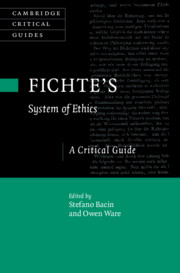Book contents
- Fichte’s System of Ethics
- Cambridge Critical Guides
- Fichte’s System of Ethics
- Copyright page
- Contents
- Contributors
- Acknowledgments
- Abbreviations and Translations
- Introduction
- Chapter 1 Fichte’s Ethics as Kantian Ethics
- Chapter 2 Fichte on Normativity in the Late Jena Period (1796–1799)
- Chapter 3 Fichte on Autonomy
- Chapter 4 Feeling, Drive, and the Lower Capacity of Desire
- Chapter 5 Fichte and the Path from “Formal” to “Material” Freedom
- Chapter 6 Fichte on the Content of Conscience
- Chapter 7 Fichte’s Theory of Moral Evil
- Chapter 8 Embodiment and Freedom
- Chapter 9 Ethics as Theory of Society
- Chapter 10 My Duties and the Morality of Others
- Bibliography
- Index
- Cambridge Critical Guides
Chapter 4 - Feeling, Drive, and the Lower Capacity of Desire
Published online by Cambridge University Press: 20 May 2021
- Fichte’s System of Ethics
- Cambridge Critical Guides
- Fichte’s System of Ethics
- Copyright page
- Contents
- Contributors
- Acknowledgments
- Abbreviations and Translations
- Introduction
- Chapter 1 Fichte’s Ethics as Kantian Ethics
- Chapter 2 Fichte on Normativity in the Late Jena Period (1796–1799)
- Chapter 3 Fichte on Autonomy
- Chapter 4 Feeling, Drive, and the Lower Capacity of Desire
- Chapter 5 Fichte and the Path from “Formal” to “Material” Freedom
- Chapter 6 Fichte on the Content of Conscience
- Chapter 7 Fichte’s Theory of Moral Evil
- Chapter 8 Embodiment and Freedom
- Chapter 9 Ethics as Theory of Society
- Chapter 10 My Duties and the Morality of Others
- Bibliography
- Index
- Cambridge Critical Guides
Summary
The chapter is devoted to Fichte’s genetic account of agency that comes to the foreground in Part II of the System of Ethics. As the chapter shows, what motivates this second deduction is a concern to avoid what Fichte calls “empty formula philosophy” which fails to explain how willing an object is possible. Fichte sets out to avoid this shortcoming by offering a complex theory of the drives, focusing first on what he calls our “lower capacity of desire.” The chapter argues that the key to understanding this section of the System of Ethics lies in Fichte’s attempt to derive the character of our “natural drive” from how we represent the system of nature as a whole. At the center of this derivation we find Fichte draw upon an organicist model of nature. This organicist model gives Fichte the resources to present an original theory of desire as an activity of “forming and being formed” by natural objects.
Keywords
- Type
- Chapter
- Information
- Fichte's System of EthicsA Critical Guide, pp. 66 - 84Publisher: Cambridge University PressPrint publication year: 2021

